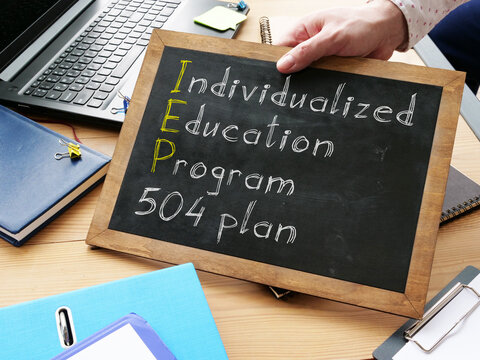Schools are the bridge between a child’s future success and their educational needs. Under certain federal laws, schools have the obligation to provide students with certain plans and programs to ensure that they receive the accommodations and assistance they require. The two most notable services provided to students under federal law are Individualized Education Plans (“IEPs”) and 504 plans.
The Differences Between an IEP and a 504 Plan
An IEP is provided to students under the Individuals with Disabilities Education Act (“IDEA”). An IEP plan is tailored to each student by providing the teacher with instructions, plans, and teaching strategies recommended for the student’s disability. Obtaining an IEP requires two qualifications. First, a child must have one or more of the 13 disabilities that are listed in the IDEA. Second, the child’s disability must significantly impact the child’s educational performance or ability to learn. Generally, it is usually only public schools that provide IEP plans to students, however, if private schools receive federal funding, either directly or indirectly, they may be obligated to provide such programming.
A 504 plan, on the other hand, is less stringent than an IEP. A 504 plan is provided to students through Section 504 of the Rehabilitation Act. This law binds both private and public schools to make reasonable accommodations to help individuals with disabilities to perform and learn effectively. Under the law, private schools are only required to make “minor” accommodations.
A disability under the Rehabilitation Act is defined as a “physical or mental impairment which substantially limits one or more major life activities.” Unlike the IDEA, the Rehabilitation Act neither lists which disabilities are covered, nor does it require an individualized program for each student. Instead, 504 plans do not require schools to make modifications tied to a student’s specific goal, but rather to a student’s ability to achieve academic success equally along their peers. Sometimes, within 504 plans, what a parent might think is a “minor” modification varies from what school leadership believes is “reasonable.”
A special advantage of a 504 plan in comparison to an IEP, is that a 504 plan follows the student into higher education. Both colleges and graduate schools can provide the accommodations a student has received in their earlier education. With the differences between an IEP and 504 in mind, it is significant for private schools to understand the available options they can or should provide to students.
Determining Minor Reasonable Modifications for Private Schools
Whereas IEPs must be provided in federally funded private schools, whether that be for school lunches, grants for technology, or any other types of financial assistance, 504 plans must be followed regardless of funding, but with limitations.
For parents of a child in private school to obtain an accommodation under Section 504, the child must have a physical or mental impairment that substantially limits a major life activity. Eligibility is then determined by the school considering all relevant information, which includes reports, evaluations, diagnoses, as well as any other 504 plans from previous schools. Usually, the minor reasonable accommodations are then mutually agreed upon between the school and parents.
Common minor accommodations under 504 plans may include: extending time for exams, changing seating arrangements, including ramps for wheelchair access in the school, repeating and/or simplifying instructions, adjusting class schedules, providing assistive technology, giving additional written instructions in lieu of oral instructions. Such accommodations are reasonable for the school to provide and allow students the opportunity to perform at the same level as their peers.

